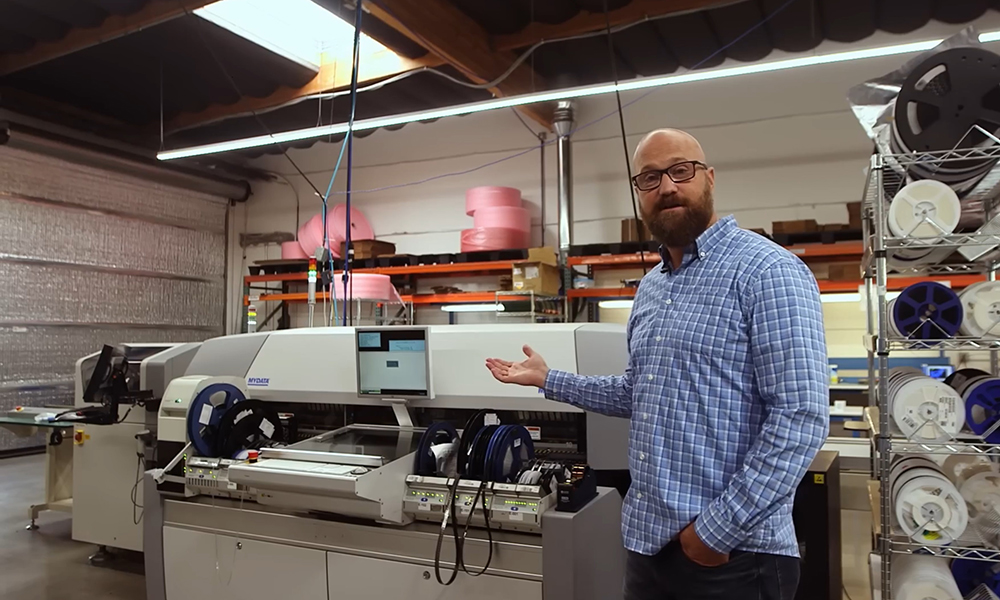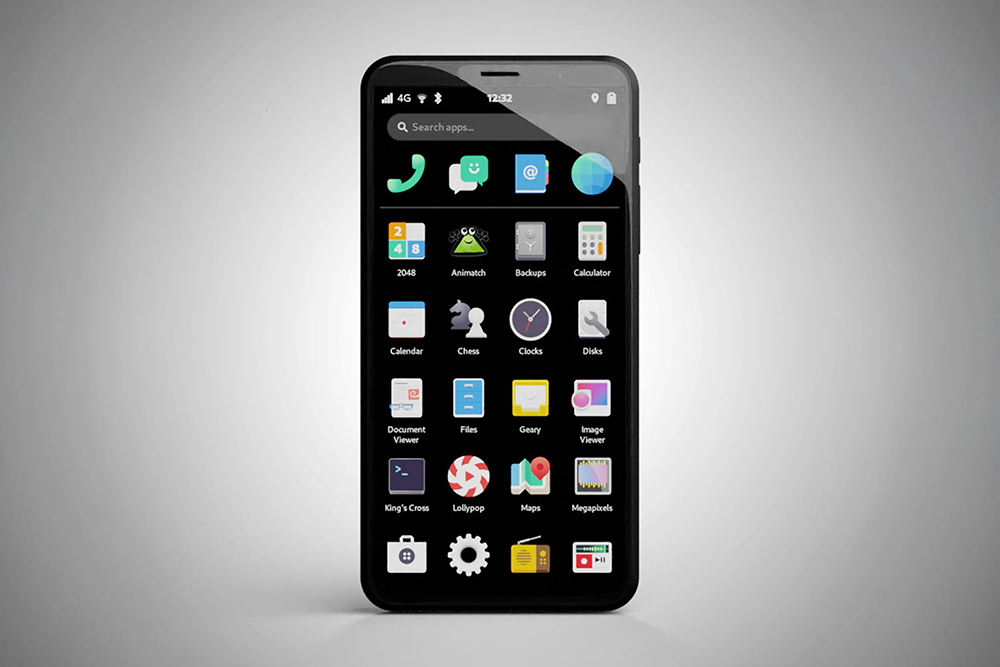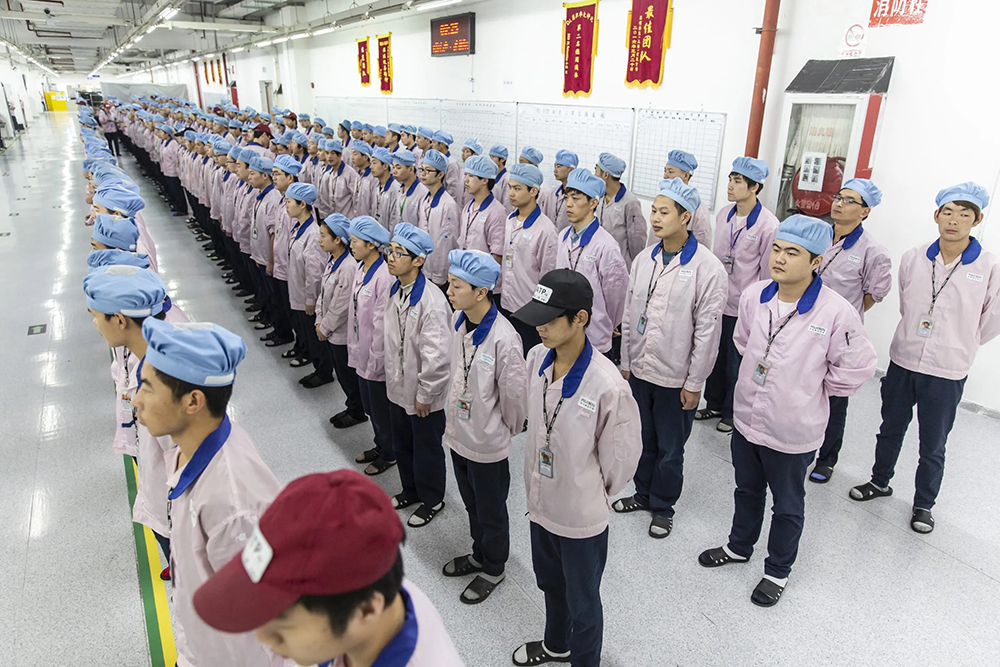
托德·韋弗向正面臨美國總統(tǒng)唐納德·特朗普施壓、要求將部分智能手機(jī)生產(chǎn)遷回美國的蘋果公司傳達(dá)了一則重要信息:切莫輕信那些老生常談,。
長期以來,,專家們一直認(rèn)為,蘋果公司若不在亞洲而是在美國生產(chǎn)iPhone,,從物流層面而言根本無法實(shí)現(xiàn),,且成本會(huì)高到令人咋舌。然而,,韋弗認(rèn)為,,倘若企業(yè)能有數(shù)年時(shí)間應(yīng)對(duì)那些難以避免的復(fù)雜狀況,確實(shí)有可能成功達(dá)成這一目標(biāo),,而且成本與在亞洲生產(chǎn)相差無幾或僅略高,。
韋弗有資格發(fā)表意見:他的初創(chuàng)企業(yè)Purism是為數(shù)不多的、甚至可能是唯一一家在美國本土組裝智能手機(jī)的企業(yè),。事實(shí)上,,“美國制造”的血統(tǒng)正是該公司主打設(shè)備——Liberty Phone的核心賣點(diǎn)。
韋弗承認(rèn):“在美國達(dá)成這一目標(biāo)極具挑戰(zhàn)性,,或許正因如此,,目前只有我在做這件事?!辈贿^,,他表示自家公司已成功實(shí)現(xiàn)這一目標(biāo),且過去兩年持續(xù)盈利,,從而為這個(gè)常被政治口號(hào)與既得利益主導(dǎo)的熱點(diǎn)話題提供了現(xiàn)實(shí)案例。
美國總統(tǒng)唐納德·特朗普近期將美國智能手機(jī)生產(chǎn)問題推至輿論焦點(diǎn),,作為其全球貿(mào)易戰(zhàn)的一部分,。5月23日,他通過社交網(wǎng)絡(luò)“真相社交”(Truth Social)公開抨擊蘋果公司從國外進(jìn)口iPhone至美國,,而非在美國本土生產(chǎn),,并威脅稱,如果蘋果公司持續(xù)這樣做,,將對(duì)其征收25%的關(guān)稅,。
鑒于特朗普朝令夕改以及第三方的法庭挑戰(zhàn),這些進(jìn)口稅是否會(huì)成為永久性措施尚不明朗,。
然而,,蘋果公司長期以來一直在海外(主要在中國)組裝iPhone,且始終拒絕將任何生產(chǎn)環(huán)節(jié)遷移至美國,。今年4月,,當(dāng)特朗普宣布加征關(guān)稅時(shí),,蘋果公司甚至將大部分面向美國市場的iPhone采購轉(zhuǎn)向印度,原因在于該國進(jìn)口關(guān)稅較低,。在公開場合,,蘋果公司從未提及在美國本土組裝iPhone的可能性。此前,,蘋果公司首席執(zhí)行官庫克解釋稱,,海外豐富的熟練勞動(dòng)力和頂尖供應(yīng)商資源難以在美國本土復(fù)制。
誠然,,韋弗的公司無法與蘋果公司相提并論,。自2007年推出首款iPhone以來,蘋果公司已在全球售出超20億部iPhone,。這些設(shè)備引領(lǐng)科技行業(yè)邁入全新時(shí)代,,讓移動(dòng)設(shè)備成為核心焦點(diǎn)。
相比之下,,據(jù)韋弗稱,,Purism自2018年推出首款機(jī)型以來,僅售出數(shù)萬部手機(jī),,且該公司在科技愛好者圈子之外幾乎無人知曉,。
其在圣迭戈附近生產(chǎn)的Liberty Phone搭載了美國制造的電子元件,安裝在來自中國的金屬機(jī)身上,,該機(jī)型零售價(jià)為1999美元,。另一款手機(jī)Librem 5設(shè)計(jì)基本相同,不過采用中國零件且在中國制造,,售價(jià)為799美元,。
該公司還生產(chǎn)平板電腦、筆記本電腦和服務(wù)器,。

該公司將其“美國制造”機(jī)型定位為比蘋果公司等主流廠商產(chǎn)品更安全、更注重隱私保護(hù)的選擇,。由于所有關(guān)鍵零部件和組裝環(huán)節(jié)均在美國本土完成,,故而極易驗(yàn)證設(shè)備未被試圖監(jiān)聽或植入爆炸物的外國對(duì)手篡改。
這些手機(jī)搭載的是基于Linux的開源操作系統(tǒng),,任何具備技術(shù)知識(shí)且擔(dān)心安全問題的用戶,,均可審查其源代碼——這與更主流的手機(jī)不同,后者搭載的操作系統(tǒng)難以輕易進(jìn)行審查,。
此外,,Purism手機(jī)配備三個(gè)物理開關(guān),用戶可借此斷開設(shè)備的蜂窩網(wǎng)絡(luò)、Wi-Fi,、藍(lán)牙連接,,還能關(guān)閉麥克風(fēng)和攝像頭。韋弗表示,,當(dāng)這些開關(guān)被打開時(shí),,它們會(huì)切斷所控制功能的電路,使黑客無法訪問這些組件,。他指出,,主流手機(jī)常用的“飛行模式”安全性較低,因?yàn)檫@純粹是軟件功能,,無法切斷設(shè)備芯片的電源,。
尤為注重安全的客戶可額外付費(fèi),為其設(shè)備在運(yùn)輸時(shí)選用“防拆封膠帶”等包裝形式,,以此標(biāo)記運(yùn)輸途中的任何異常操作,。
Purism的主要客戶是政府機(jī)構(gòu),其中許多機(jī)構(gòu)對(duì)安全性要求極高,,以及個(gè)人消費(fèi)者,。韋弗稱,該公司的客戶包括聯(lián)邦調(diào)查局和眾議院情報(bào)委員會(huì),。
韋弗表示,,盡管Purism的兩款手機(jī)分別在海外和本土生產(chǎn),但制造成本大體相當(dāng),。中國制造的機(jī)型在零部件,、制造和組裝方面的成本約為600美元,而美國制造的機(jī)型則為650美元,。
韋弗表示,,基于自動(dòng)化程度考量,“中美兩國生產(chǎn)商品的成本差異在正負(fù)10%以內(nèi)”,。
兩款手機(jī)售價(jià)存在差異,,部分原因在于Purism對(duì)美國制造機(jī)型設(shè)定了更高的利潤率。韋弗指出,,那些追求更高安全性的用戶,通常愿意為此支付溢價(jià),。這也覆蓋了部分客戶要求驗(yàn)證供應(yīng)鏈安全性所產(chǎn)生的額外管理成本,,以及美國制造帶來的少量附加成本。
解決技能短缺問題
Purism的組裝線位于加利福尼亞州卡爾斯巴德,,最多配備十幾名工人負(fù)責(zé)設(shè)備組裝,。由于當(dāng)?shù)貒拦I(yè)和其他移動(dòng)運(yùn)營商的制造業(yè)基礎(chǔ),該地區(qū)擁有大量熟練勞動(dòng)力。
這條規(guī)模相對(duì)較小的組裝線,,與由合同制造商運(yùn)營,、且大多位于中國的iPhone工廠形成了鮮明對(duì)比,那些工廠規(guī)??氨葦?shù)個(gè)足球場,,員工數(shù)量超10萬,且實(shí)行24小時(shí)輪班制,。
韋弗指出,,在熟練工人方面,美國較中國存在顯著劣勢,,而這類人才在智能手機(jī)工廠勞動(dòng)力中占據(jù)相當(dāng)大的比例,。他認(rèn)為,要扭轉(zhuǎn)人才短缺局面并為企業(yè)生產(chǎn)回流奠定基礎(chǔ),,唯一途徑就是鼓勵(lì)更多人掌握制造業(yè)實(shí)用技能,。
韋弗表示:“如果你去中國,會(huì)看到一棟棟大樓里匯聚著成千上萬的電子工程師,;而在美國,,你可能總共只能找到5個(gè)?!?/p>

韋弗表示,,例如,,蘋果公司若在2026年突然需要擴(kuò)大美國員工規(guī)模以生產(chǎn)數(shù)百萬部iPhone,可能會(huì)面臨災(zāi)難性后果,。為如此龐大的生產(chǎn)計(jì)劃培訓(xùn)足夠的人手需要耗費(fèi)數(shù)年時(shí)間,。
韋弗表示,成立于2014年的Purism歷經(jīng)數(shù)年才建立起國內(nèi)供應(yīng)鏈,。由于公司規(guī)模較小,,零部件需求量有限,因此無法通過大規(guī)模生產(chǎn)設(shè)備來實(shí)現(xiàn)規(guī)模經(jīng)濟(jì)效益,。在美國制造的成本也高于中國,。不過,借助自動(dòng)化技術(shù),,通過將人力保留到生產(chǎn)完成后的焊接,、組裝、維修和測試等環(huán)節(jié),,這些額外成本得以控制在最低水平,。
韋弗指出,,另一方面,蘋果公司則需要大量零部件來維持組裝線運(yùn)轉(zhuǎn),。雖然該公司極有可能與國內(nèi)供應(yīng)商達(dá)成協(xié)議,,采購大部分iPhone零部件,但某些零件(如高質(zhì)量攝像頭)可能無法在美國迅速采購,,必須進(jìn)口,。
一位分析師曾表示,考慮到額外成本及諸多麻煩,,若在美國生產(chǎn)iPhone,,其售價(jià)可能高達(dá)3500美元。韋弗認(rèn)為,,如果蘋果公司必須迅速轉(zhuǎn)移生產(chǎn),,在美國生產(chǎn)iPhone的成本將大幅攀升。但若給予足夠時(shí)間,,通過開發(fā)新供應(yīng)鏈,、招募足夠多的工人并借助廣泛的自動(dòng)化手段,蘋果公司能夠大幅降低成本,。
超越細(xì)分市場
韋弗表示,,對(duì)于蘋果公司而言,開設(shè)國內(nèi)制造工廠是一個(gè)需耗時(shí)數(shù)年的漫長過程,。這也是他批評(píng)特朗普的關(guān)稅政策幾乎立即生效的原因,。盡管此后諸多關(guān)稅已被推遲。但對(duì)企業(yè)而言,,這意味著它們無法提前規(guī)劃,。然而,將生產(chǎn)轉(zhuǎn)移到美國這樣復(fù)雜的事情恰恰需要提前規(guī)劃,。
韋弗表示,,如果特朗普的關(guān)稅政策分多年逐步實(shí)施,效果將會(huì)更佳,。在這種情況下,,企業(yè)將有明確且不斷增強(qiáng)的動(dòng)力推動(dòng)生產(chǎn)回流,而非立刻遭受懲罰,。
韋弗認(rèn)為,,他在美國的制造實(shí)踐已初見成效,而且隨著時(shí)間推移,,會(huì)獲得更大的發(fā)展動(dòng)力,。他希望最近涉及美國官員使用聊天應(yīng)用Signal討論對(duì)也門發(fā)動(dòng)軍事打擊、卻意外邀請一名記者加入的丑聞,,能促使聯(lián)邦政府更加重視安全問題,,進(jìn)而推動(dòng)產(chǎn)品銷量提升。
韋弗并未披露Purism的財(cái)務(wù)細(xì)節(jié),,僅表示該公司年?duì)I收達(dá)數(shù)百萬美元,,并在2023年實(shí)現(xiàn)盈利,其最暢銷產(chǎn)品為Liberty Phone,。
市場研究公司TechInsights的分析師韋恩·拉姆(Wayne Lam)對(duì)Purism的前景作出折中評(píng)價(jià),。他在一封郵件中表示:“它們或許能成為成功的細(xì)分市場參與者,但鑒于大品牌占據(jù)主導(dǎo),,成功的幾率較低,。他們無法在消費(fèi)市場競爭,但政府/企業(yè)/軍方都是他們可以瞄準(zhǔn)的細(xì)分市場,?!?
為拓展業(yè)務(wù)版圖,韋弗正謀求在過去數(shù)年獲得的1600萬美元融資基礎(chǔ)上,,進(jìn)一步籌集資金,。其中部分資金將用于彌補(bǔ)其手機(jī)的短板。鑒于該手機(jī)未采用蘋果的iOS或谷歌的安卓(Android)操作系統(tǒng),,導(dǎo)致其與諸多熱門移動(dòng)應(yīng)用(如優(yōu)步(Uber))存在兼容性問題,,為讓這些應(yīng)用能在其設(shè)備上運(yùn)行,Purism必須針對(duì)每個(gè)應(yīng)用進(jìn)行技術(shù)調(diào)整,。
Purism至少能宣稱相較于主導(dǎo)智能手機(jī)行業(yè)的巨頭,,具備一項(xiàng)微弱優(yōu)勢。如果特朗普的關(guān)稅成為永久性措施,,其美國制造機(jī)型受影響程度較小,,而大型廠商及其在國外制造的設(shè)備則可能遭受重創(chuàng)。(財(cái)富中文網(wǎng))
譯者:中慧言-王芳
托德·韋弗向正面臨美國總統(tǒng)唐納德·特朗普施壓,、要求將部分智能手機(jī)生產(chǎn)遷回美國的蘋果公司傳達(dá)了一則重要信息:切莫輕信那些老生常談,。
長期以來,專家們一直認(rèn)為,,蘋果公司若不在亞洲而是在美國生產(chǎn)iPhone,,從物流層面而言根本無法實(shí)現(xiàn),且成本會(huì)高到令人咋舌,。然而,,韋弗認(rèn)為,倘若企業(yè)能有數(shù)年時(shí)間應(yīng)對(duì)那些難以避免的復(fù)雜狀況,,確實(shí)有可能成功達(dá)成這一目標(biāo),,而且成本與在亞洲生產(chǎn)相差無幾或僅略高。
韋弗有資格發(fā)表意見:他的初創(chuàng)企業(yè)Purism是為數(shù)不多的,、甚至可能是唯一一家在美國本土組裝智能手機(jī)的企業(yè),。事實(shí)上,,“美國制造”的血統(tǒng)正是該公司主打設(shè)備——Liberty Phone的核心賣點(diǎn)。
韋弗承認(rèn):“在美國達(dá)成這一目標(biāo)極具挑戰(zhàn)性,,或許正因如此,,目前只有我在做這件事?!辈贿^,,他表示自家公司已成功實(shí)現(xiàn)這一目標(biāo),且過去兩年持續(xù)盈利,,從而為這個(gè)常被政治口號(hào)與既得利益主導(dǎo)的熱點(diǎn)話題提供了現(xiàn)實(shí)案例,。
美國總統(tǒng)唐納德·特朗普近期將美國智能手機(jī)生產(chǎn)問題推至輿論焦點(diǎn),作為其全球貿(mào)易戰(zhàn)的一部分,。5月23日,,他通過社交網(wǎng)絡(luò)“真相社交”(Truth Social)公開抨擊蘋果公司從國外進(jìn)口iPhone至美國,而非在美國本土生產(chǎn),,并威脅稱,,如果蘋果公司持續(xù)這樣做,將對(duì)其征收25%的關(guān)稅,。
鑒于特朗普朝令夕改以及第三方的法庭挑戰(zhàn),,這些進(jìn)口稅是否會(huì)成為永久性措施尚不明朗。
然而,,蘋果公司長期以來一直在海外(主要在中國)組裝iPhone,,且始終拒絕將任何生產(chǎn)環(huán)節(jié)遷移至美國。今年4月,,當(dāng)特朗普宣布加征關(guān)稅時(shí),,蘋果公司甚至將大部分面向美國市場的iPhone采購轉(zhuǎn)向印度,原因在于該國進(jìn)口關(guān)稅較低,。在公開場合,,蘋果公司從未提及在美國本土組裝iPhone的可能性。此前,,蘋果公司首席執(zhí)行官庫克解釋稱,,海外豐富的熟練勞動(dòng)力和頂尖供應(yīng)商資源難以在美國本土復(fù)制。
誠然,,韋弗的公司無法與蘋果公司相提并論,。自2007年推出首款iPhone以來,蘋果公司已在全球售出超20億部iPhone,。這些設(shè)備引領(lǐng)科技行業(yè)邁入全新時(shí)代,,讓移動(dòng)設(shè)備成為核心焦點(diǎn)。
相比之下,,據(jù)韋弗稱,,Purism自2018年推出首款機(jī)型以來,,僅售出數(shù)萬部手機(jī),且該公司在科技愛好者圈子之外幾乎無人知曉,。
其在圣迭戈附近生產(chǎn)的Liberty Phone搭載了美國制造的電子元件,,安裝在來自中國的金屬機(jī)身上,該機(jī)型零售價(jià)為1999美元,。另一款手機(jī)Librem 5設(shè)計(jì)基本相同,不過采用中國零件且在中國制造,,售價(jià)為799美元,。
該公司還生產(chǎn)平板電腦、筆記本電腦和服務(wù)器,。
該公司將其“美國制造”機(jī)型定位為比蘋果公司等主流廠商產(chǎn)品更安全,、更注重隱私保護(hù)的選擇。由于所有關(guān)鍵零部件和組裝環(huán)節(jié)均在美國本土完成,,故而極易驗(yàn)證設(shè)備未被試圖監(jiān)聽或植入爆炸物的外國對(duì)手篡改,。
這些手機(jī)搭載的是基于Linux的開源操作系統(tǒng),任何具備技術(shù)知識(shí)且擔(dān)心安全問題的用戶,,均可審查其源代碼——這與更主流的手機(jī)不同,,后者搭載的操作系統(tǒng)難以輕易進(jìn)行審查。
此外,,Purism手機(jī)配備三個(gè)物理開關(guān),,用戶可借此斷開設(shè)備的蜂窩網(wǎng)絡(luò)、Wi-Fi,、藍(lán)牙連接,,還能關(guān)閉麥克風(fēng)和攝像頭。韋弗表示,,當(dāng)這些開關(guān)被打開時(shí),,它們會(huì)切斷所控制功能的電路,使黑客無法訪問這些組件,。他指出,,主流手機(jī)常用的“飛行模式”安全性較低,因?yàn)檫@純粹是軟件功能,,無法切斷設(shè)備芯片的電源,。
尤為注重安全的客戶可額外付費(fèi),為其設(shè)備在運(yùn)輸時(shí)選用“防拆封膠帶”等包裝形式,,以此標(biāo)記運(yùn)輸途中的任何異常操作,。
Purism的主要客戶是政府機(jī)構(gòu),其中許多機(jī)構(gòu)對(duì)安全性要求極高,,以及個(gè)人消費(fèi)者,。韋弗稱,,該公司的客戶包括聯(lián)邦調(diào)查局和眾議院情報(bào)委員會(huì)。
韋弗表示,,盡管Purism的兩款手機(jī)分別在海外和本土生產(chǎn),,但制造成本大體相當(dāng)。中國制造的機(jī)型在零部件,、制造和組裝方面的成本約為600美元,,而美國制造的機(jī)型則為650美元。
韋弗表示,,基于自動(dòng)化程度考量,,“中美兩國生產(chǎn)商品的成本差異在正負(fù)10%以內(nèi)”。
兩款手機(jī)售價(jià)存在差異,,部分原因在于Purism對(duì)美國制造機(jī)型設(shè)定了更高的利潤率,。韋弗指出,那些追求更高安全性的用戶,,通常愿意為此支付溢價(jià),。這也覆蓋了部分客戶要求驗(yàn)證供應(yīng)鏈安全性所產(chǎn)生的額外管理成本,以及美國制造帶來的少量附加成本,。
解決技能短缺問題
Purism的組裝線位于加利福尼亞州卡爾斯巴德,,最多配備十幾名工人負(fù)責(zé)設(shè)備組裝。由于當(dāng)?shù)貒拦I(yè)和其他移動(dòng)運(yùn)營商的制造業(yè)基礎(chǔ),,該地區(qū)擁有大量熟練勞動(dòng)力,。
這條規(guī)模相對(duì)較小的組裝線,與由合同制造商運(yùn)營,、且大多位于中國的iPhone工廠形成了鮮明對(duì)比,,那些工廠規(guī)模堪比數(shù)個(gè)足球場,,員工數(shù)量超10萬,,且實(shí)行24小時(shí)輪班制。
韋弗指出,,在熟練工人方面,,美國較中國存在顯著劣勢,而這類人才在智能手機(jī)工廠勞動(dòng)力中占據(jù)相當(dāng)大的比例,。他認(rèn)為,,要扭轉(zhuǎn)人才短缺局面并為企業(yè)生產(chǎn)回流奠定基礎(chǔ),唯一途徑就是鼓勵(lì)更多人掌握制造業(yè)實(shí)用技能,。
韋弗表示:“如果你去中國,,會(huì)看到一棟棟大樓里匯聚著成千上萬的電子工程師;而在美國,你可能總共只能找到5個(gè),?!?/p>
韋弗表示,例如,,蘋果公司若在2026年突然需要擴(kuò)大美國員工規(guī)模以生產(chǎn)數(shù)百萬部iPhone,,可能會(huì)面臨災(zāi)難性后果。為如此龐大的生產(chǎn)計(jì)劃培訓(xùn)足夠的人手需要耗費(fèi)數(shù)年時(shí)間,。
韋弗表示,,成立于2014年的Purism歷經(jīng)數(shù)年才建立起國內(nèi)供應(yīng)鏈。由于公司規(guī)模較小,,零部件需求量有限,,因此無法通過大規(guī)模生產(chǎn)設(shè)備來實(shí)現(xiàn)規(guī)模經(jīng)濟(jì)效益。在美國制造的成本也高于中國,。不過,借助自動(dòng)化技術(shù),,通過將人力保留到生產(chǎn)完成后的焊接,、組裝、維修和測試等環(huán)節(jié),,這些額外成本得以控制在最低水平,。
韋弗指出,另一方面,,蘋果公司則需要大量零部件來維持組裝線運(yùn)轉(zhuǎn),。雖然該公司極有可能與國內(nèi)供應(yīng)商達(dá)成協(xié)議,采購大部分iPhone零部件,,但某些零件(如高質(zhì)量攝像頭)可能無法在美國迅速采購,,必須進(jìn)口。
一位分析師曾表示,,考慮到額外成本及諸多麻煩,,若在美國生產(chǎn)iPhone,其售價(jià)可能高達(dá)3500美元,。韋弗認(rèn)為,,如果蘋果公司必須迅速轉(zhuǎn)移生產(chǎn),在美國生產(chǎn)iPhone的成本將大幅攀升,。但若給予足夠時(shí)間,,通過開發(fā)新供應(yīng)鏈、招募足夠多的工人并借助廣泛的自動(dòng)化手段,,蘋果公司能夠大幅降低成本,。
超越細(xì)分市場
韋弗表示,對(duì)于蘋果公司而言,開設(shè)國內(nèi)制造工廠是一個(gè)需耗時(shí)數(shù)年的漫長過程,。這也是他批評(píng)特朗普的關(guān)稅政策幾乎立即生效的原因,。盡管此后諸多關(guān)稅已被推遲。但對(duì)企業(yè)而言,,這意味著它們無法提前規(guī)劃,。然而,將生產(chǎn)轉(zhuǎn)移到美國這樣復(fù)雜的事情恰恰需要提前規(guī)劃,。
韋弗表示,,如果特朗普的關(guān)稅政策分多年逐步實(shí)施,效果將會(huì)更佳,。在這種情況下,,企業(yè)將有明確且不斷增強(qiáng)的動(dòng)力推動(dòng)生產(chǎn)回流,而非立刻遭受懲罰,。
韋弗認(rèn)為,,他在美國的制造實(shí)踐已初見成效,而且隨著時(shí)間推移,,會(huì)獲得更大的發(fā)展動(dòng)力,。他希望最近涉及美國官員使用聊天應(yīng)用Signal討論對(duì)也門發(fā)動(dòng)軍事打擊、卻意外邀請一名記者加入的丑聞,,能促使聯(lián)邦政府更加重視安全問題,,進(jìn)而推動(dòng)產(chǎn)品銷量提升。
韋弗并未披露Purism的財(cái)務(wù)細(xì)節(jié),,僅表示該公司年?duì)I收達(dá)數(shù)百萬美元,,并在2023年實(shí)現(xiàn)盈利,其最暢銷產(chǎn)品為Liberty Phone,。
市場研究公司TechInsights的分析師韋恩·拉姆(Wayne Lam)對(duì)Purism的前景作出折中評(píng)價(jià),。他在一封郵件中表示:“它們或許能成為成功的細(xì)分市場參與者,但鑒于大品牌占據(jù)主導(dǎo),,成功的幾率較低,。他們無法在消費(fèi)市場競爭,但政府/企業(yè)/軍方都是他們可以瞄準(zhǔn)的細(xì)分市場,?!?
為拓展業(yè)務(wù)版圖,韋弗正謀求在過去數(shù)年獲得的1600萬美元融資基礎(chǔ)上,,進(jìn)一步籌集資金,。其中部分資金將用于彌補(bǔ)其手機(jī)的短板。鑒于該手機(jī)未采用蘋果的iOS或谷歌的安卓(Android)操作系統(tǒng),,導(dǎo)致其與諸多熱門移動(dòng)應(yīng)用(如優(yōu)步(Uber))存在兼容性問題,,為讓這些應(yīng)用能在其設(shè)備上運(yùn)行,Purism必須針對(duì)每個(gè)應(yīng)用進(jìn)行技術(shù)調(diào)整。
Purism至少能宣稱相較于主導(dǎo)智能手機(jī)行業(yè)的巨頭,,具備一項(xiàng)微弱優(yōu)勢,。如果特朗普的關(guān)稅成為永久性措施,其美國制造機(jī)型受影響程度較小,,而大型廠商及其在國外制造的設(shè)備則可能遭受重創(chuàng),。(財(cái)富中文網(wǎng))
譯者:中慧言-王芳
Todd Weaver has an important message for Apple as it faces growing demands by President Donald Trump to reshore some of its smartphone production: Don’t listen to the conventional wisdom.
Experts have long said that manufacturing iPhones in the U.S., rather than Asia, as Apple does, would be logistically impossible and ridiculously expensive. But Weaver argues companies can indeed do it successfully, and at a similar or only slightly higher cost—if given several years to navigate the inevitable complications.
Weaver should know: His startup, Purism, is among the few, if not the only business, that assembles smartphones in the U.S. In fact, the U.S. pedigree is the main selling point of his company’s Made in America device, the Liberty Phone.
“It is challenging to do this in the U.S.,” Weaver acknowledges. “It’s probably the reason I’m the only one.” And yet, he says his company has managed to make it work and has been profitable for the last two years—a real world example of what’s possible on a hot-button topic in which political talking points and vested interests often dominate the debate.
President Donald Trump recently put U.S. smartphone production in the spotlight as part of his global trade war. On May 23, he used social network Truth Social to publicly attack Apple for importing iPhones into the U.S., rather than making them domestically, and then threatened the company with a 25% tariff if it continued to do so.
Whether any of the import taxes will become permanent is unclear given Trump’s whiplash decision-making and court challenges by third parties.
Still, Apple has long assembled its iPhones overseas, mainly in China, and has resisted relocating any of that production to the U.S. In April, when Trump announced his tariffs, Apple went so far as to shift the sourcing of most U.S.-bound iPhones to India, which faced lower import taxes. U.S. assembly was never publicly mentioned as a possibility. In the past, Apple CEO Cook explained the reluctance by saying the abundance of skilled labor and top-notch suppliers overseas would be difficult to reproduce at home.
Weaver’s company, of course, is no Apple, which has sold more than 2 billion iPhones globally since introducing the first models in 2007. The devices unleashed a new era in the tech industry in which mobile devices became the prime focus.
Purism, in contrast, has sold just tens of thousands of phones since debuting its first model in 2018, according to Weaver. And the company is barely-known outside the world of tech nerds.
Its Liberty Phone, manufactured near San Diego, comes with U.S.-made electronics installed on a metal chassis from China. It retails for $1,999. Another phone, the Librem 5, is mostly the same design, except it’s made in China with Chinese parts, and costs $799.
The company also produces tablet computers, laptops, and servers.
Purism pitches its Made in America device as more secure and privacy friendly than those from major manufactures like Apple. Because all the critical parts and assembly are domestic, it’s easy to verify that they haven’t been tampered with by a foreign adversary that wants to snoop or stuff them with explosives.
The phones also run on a Linux-based open source operating system. Anyone with technical know-how who is worried about the security can review the code—unlike with more popular phones, which come with operating systems that can’t be easily inspected.
Additionally, Purism’s phones come with three kill switches that lets users physically disconnect their device from cell service, Wi-Fi and Bluetooth, along with its microphone and camera. When turned on, the switches sever the electrical circuit to the features they control and make it impossible for them to be accessed by hackers, Weaver said. Toggling on Airplane Mode, as users often do on more mainstream phones, is less secure, he said, because it’s a purely software feature that doesn’t cut power to the device’s chips.
Customers who are especially security conscious can pay extra to have their devices shipped with “tamper evident tape” on the packaging, among other options, to flag any monkey business during transit.
Purism’s biggest customers are government agencies, many of which require high security, and individual consumers. The company’s clients, Weaver said, include the FBI and the House Select Committee on Intelligence.
Weaver said the cost of manufacturing the Purism’s two phones is largely the same, despite one being made overseas and the other domestically. The phone that’s made in China costs around $600 for parts, manufacturing, and assembly while the U.S.-made one comes in at $650.
“Producing goods in China vs. the U.S. is the same plus or minus 10%,” said Weaver, based mostly on automation.
The difference between what Purism charges customers for its two phones is partly due to the higher profit margin the company collects for its U.S.-made device. People who want stronger security are often willing to pay extra for it, Weaver said. It also covers the extra overhead from some customers wanting to verify that Purism’s supply chain is secure and the small additional cost of U.S. manufacturing.
Solving the skills shortage
Purism’s assembly line is in Carlsbad, Calif., where up to a dozen workers put together devices. The area is home to a pool of skilled labor thanks to the local defense industry and manufacturing for other mobile carriers.
That relatively modest assembly line is a major contrast to the factories that make iPhones, operated by contract manufacturers, mostly in China. Those facilities can be the size of several football fields and employ over 100,000 people who work around-the-clock shifts.
Weaver said the U.S. is at a huge disadvantage to China when it comes to skilled workers, who make up a significant part of the workforce in smartphone factories. The only way to reverse the shortage and lay the groundwork for companies to reshore their production is to encourage more people to learn skills that are useful in the manufacturing process, he said.
“If you go over to China you can find buildings and buildings of thousands of electronics engineers. If you look here, you can find maybe five total,” Weaver said.
Apple, for example, would risk a catastrophe if it suddenly, in 2026, needed to ramp up staffing in the U.S. to produce millions of iPhones, he said. Training enough people for such a massive undertaking would take years.
Weaver said Purism, founded in 2014, took several years to develop its domestic supply chain. The company’s small size means it only needs limited quantities of components, which makes it impossible to achieve the economies of scale that come from producing huge numbers of devices. Manufacturing in the U.S. also comes with higher labor costs than in China. But with the help of automation, those extra costs can be kept to a minimum by reserving human labor for tasks performed after production is complete, such as soldering, assembly, repairs, and testing.
Apple, on the other hand, would need vast amounts of components to keep its assembly line humming. While the company would likely be able to cut deals with domestic suppliers for most iPhone parts, some, such as high-quality cameras, may be impossible to quickly source in the U.S. and it would therefore have to import them, Weaver said.
One analyst has said iPhones could end up costing $3,500 if made in the U.S., to account for the extra costs and hassles. Weaver agrees that it would cost Apple substantially more to produce iPhones in the U.S., if it had to move production quickly. But given enough time, Apple could substantially reduce the cost after developing a new supply chain, finding enough workers, and by relying on extensive automation.
Growing beyond the niche
For Apple, opening a domestic manufacturing plant would therefore need to be a years’ long process, Weaver said. That’s why he criticized Trump’s tariffs for taking effect almost immediately. Yes, many of those tariffs have since been delayed. But the takeaway for businesses is that they can’t plan ahead. And yet, that’s exactly what’s required for something as complex as shifting manufacturing to the U.S.
Trump’s tariffs would be far more effective if phased in over many years, Weaver said. In that scenario, companies would have a clear and increasing incentive to reshore production—without being punished right off the bat.
Weaver argues his U.S. manufacturing effort is already paying off and that it will gain momentum over time. He hopes the recent scandal involving U.S. officials using the chat app Signal to discuss a military strike against Yemen, and then accidentally inviting a journalist to join them, will help lift sales by encouraging the federal government to focus more on security.
Weaver wouldn’t get into the specifics of Purism’s financials other than to say it has millions in annual revenue and turned profitable in 2023. The Liberty Phone is its biggest seller.
Wayne Lam, an analyst with market research firm TechInsights, gave a mixed take on Purism’s prospect. In an email, he said: “They can be a successful niche player, but the odds of success are lower thanks to the bigger brands. They won’t be able to compete in the consumer market but government/enterprise/military are all niche markets they can address.”
To fund the expansion of his business, Weaver is trying to raise additional investment after taking in $16 million in funding over the years. Some of that money would go to fixing a shortcoming with his phones. Because they don’t use Apple’s iOS or Google’s Android operating systems, they are incompatible with many of the most popular mobile apps like Uber. To get such apps work on its devices, Purism must make technical tweaks for each one.
Purism can at least claim one small advantage over the giant companies that dominate the smartphone industry. If Trump’s tariffs become permanent, it won’t feel much impact from its U.S.-made phone, while the big players and their foreign-made devices could be hammered.






